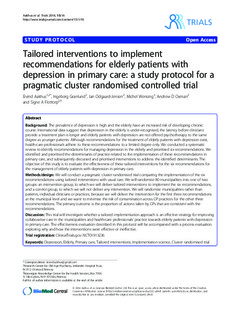| dc.description.abstract | Background The prevalence of depression is high and the elderly have an increased risk of developing chronic course. International data suggest that depression in the elderly is under-recognised, the latency before clinicians provide a treatment plan is longer and elderly patients with depression are not offered psychotherapy to the same degree as younger patients. Although recommendations for the treatment of elderly patients with depression exist, health-care professionals adhere to these recommendations to a limited degree only. We conducted a systematic review to identify recommendations for managing depression in the elderly and prioritised six recommendations. We identified and prioritised the determinants of practice related to the implementation of these recommendations in primary care, and subsequently discussed and prioritised interventions to address the identified determinants. The objective of this study is to evaluate the effectiveness of these tailored interventions for the six recommendations for the management of elderly patients with depression in primary care. Methods/design We will conduct a pragmatic cluster randomised trial comparing the implementation of the six recommendations using tailored interventions with usual care. We will randomise 80 municipalities into one of two groups: an intervention group, to which we will deliver tailored interventions to implement the six recommendations, and a control group, to which we will not deliver any intervention. We will randomise municipalities rather than patients, individual clinicians or practices, because we will deliver the intervention for the first three recommendations at the municipal level and we want to minimise the risk of contamination across GP practices for the other three recommendations. The primary outcome is the proportion of actions taken by GPs that are consistent with the recommendations. Discussion This trial will investigate whether a tailored implementation approach is an effective strategy for improving collaborative care in the municipalities and health-care professionals’ practice towards elderly patients with depression in primary care. The effectiveness evaluation described in this protocol will be accompanied with a process evaluation exploring why and how the interventions were effective or ineffective. | |
